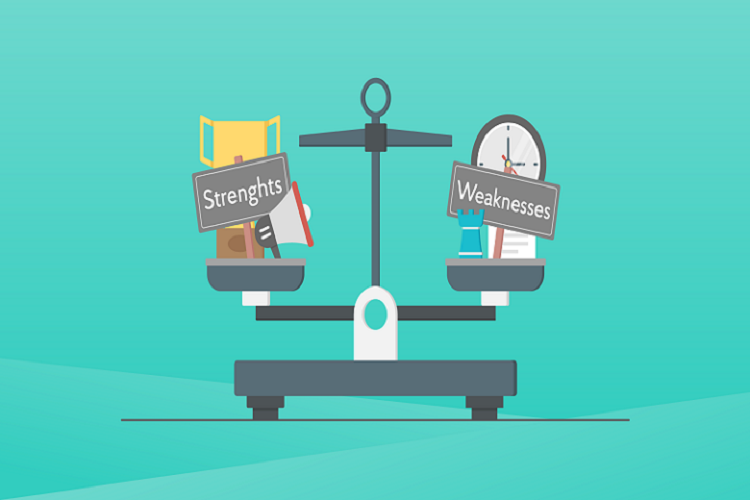




As an entrepreneur, it is critical that you know yourself well, how you act in situations, your strengths and weaknesses. This self-assessment will show you where you can play to your strengths, and bring in others to fill your weaknesses. The subsequent questions turn out to be, how do you define strength and a weakness?
Marcus Buckingham, a best-selling author and business consultant, defines strengths and weaknesses by the emotions that they evoke. Paraphrasing, he states:
“A strength is something that makes you feel stronger after you complete the task. It energizes you. On the other hand, a weakness is something that drains you physically – in other words, you may very well be good at a particular task or skill, yet when you complete it, it leaves you more tired than when you started.”
Marcus goes on to say that you must drop those weaknesses, and focus on your strengths. I agree with the definitions that Marcus has described. And although a weakness could be something that physically and mentally drains you, it may also be something that has not been fully developed within you. Therefore, as you consciously focus to develop a particular skill, you may find that it starts to become a strength.You may realize that the identified weakness has been holding you back, but as you develop and strengthen it, you find that new opportunities come to light.
Think about your company and the people who work for you. What are their strengths and weaknesses? According to Buckingham, once the strengths and weaknesses have been identified, each individual should play to their strengths, which ideally, are different from others, and therefore compliment the teams, thus creating a strong unit acting as one.
Now, take it one step further. Each individual identifies both their strengths and weaknesses and then focus on their strengths in the work place. On their own time, they choose one or two weaknesses which they feel they can further develop and turn into a strength.This over time, will allow the team to evolve as new strengths are added to each individual, making the whole team stronger.
The important thing is not that you have identified your strengths and weaknesses, but that you continuously adapt, evolve, and improve upon them. It is also critical that you leverage your strengths to be successful. As companies retool and rebuild themselves through this tough economy, it the strengths of the individuals that will help direct the company in a new direction. If everyone can get on the same page, knowing each other’s strengths, then the company can better position itself for success not only during an economic downturn, but during the good times as well.
Now that we have discussed about understanding strengths and weaknesses in an entrepreneur and employees, it’s time we discuss A Leader’s Strengths And Weaknesses: Knowing, Understanding And Utilizing Optimally
As a leader, how well do you know yourself? Are you willing to be objectively introspective enough, so as to be able to recognize and consider your personal strengths and weaknesses? Although these are needed and necessary qualities and assets, for each and every individual, those in positions of leadership will nearly always have little chance or opportunity, to transform from merely holding an office, to truly becoming a quality leader, unless they truly know and understand themselves, and can do so, in an objective manner. After over three decades of involvement in nearly all areas of leadership, both in terms of training others, as well as personally being a leader, I have come to believe that leadership training programs should mandate these activities. Before one should be consider qualified, he should be asked what he considers his personal strengths and weaknesses, and unless the individual can clearly articulate these, he probably is not the right person to lead others! Ask yourself these basic 3 questions, before you consider proceeding to be a leader.
1. What are your strengths and weaknesses? How often you take an honest, objective, introspective look, and review yourself as others might, or how you might evaluate others? Why do consider these stronger areas to be strengths for a leader, and how might they make you better and more significant? What are you willing to do about your personal weaknesses, and what are the options and/or alternatives?
2. Will you address your weaknesses, and discover/come up with, ways to overcome them? Can you transform a weakness to a strength, or will you merely shrug your shoulders, and use it as an excuse? Why do you believe these areas need addressing, and how might they complicate leading? Do you recognize your options, including personally improving, learning and getting better, as well as surrounding yourself with an inner circle of quality advisers, with strengths that will enhance you, and take up the slack, especially in areas where you might possess some deficiencies?
3. How will your strengths help you become a better leader, and how will you use them, to your best avail? Your personal strengths should be understood, so you are best able to do the best possible job, for your organization and its stakeholders. Can you differentiate between others that merely parrot what they believe you want to hear, and those who are providing well-considered alternatives or courses of action, that will make your service more meaningful and significant?
Don’t overstate your strengths (or feel you’re stronger than you really are), nor let your weaknesses overwhelm you! Embrace both objectively, and focus on the best way to proceed, to get the best, most desirable results.
Source: https://www.linkedin.com/pulse/strengths-weaknesses-you-harsh-gupta/